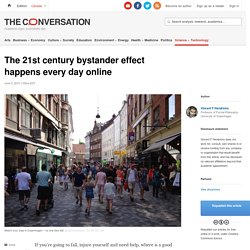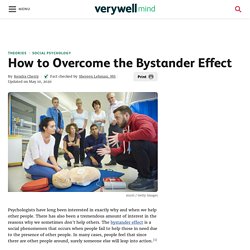

It also defines as the effect of certain social pressures on emergency responses in people (John Darley and Bibb Latane ,1969).
There are many causes of the bystander effect, such as thinking someone else will help, it is not emergency situation and waiting others to response then follow the reaction. People are trained to ignore this feeling and offer help whenever they see a situation they deem an emergency.
People observe each other before assisting, the more people in the emergency situation, the longer time it takes for people to response, ie. bystander behavior reinforce even more.
The Bystander Effect:The Death of Kitty Genovese.
The concept of bystander effect was coined after Kitty Genovese was stabbed to death in New York,1964 (Hudson & Bruckman, 2004, p. 168; Manning, Levine & Collins, 2007, p. 555). It was allegedly reported that despite hearing her shout for help and seeing her murder from their apartment, none of her 38 neighbours had intervened or called the police. – priciliachan
In an emergency situation, where there is many people around, people may not offer help and find excuse for their non response reaction. – priciliachan
Traits Of A Bystander. Causes Of The Bystander Effect (Bystander Apathy)
These are main factor that causes bystander effect, but there could be more reason for it such as no empathy and society expectation. – priciliachan
The Bystander Effect tested on a group of 10, 5 and 1 person. The result shows that the larger the group, the longer it takes for subject to offer help, as subject observe and see others would offer helpbefore they response. – priciliachan
The 21st century bystander effect happens every day online. If you’re going to fall, injure yourself and need help, where is a good place to do it?
If the young woman or man or the elderly gentlemen were wearing business suits and fell, the time it took for someone to intervene could be as short as a few seconds. For the actors wearing shabby outfits, it could take up to around four minutes for anyone to intervene, even though plenty of people witnessed the accident. This studies shows that bystander effect, as people would expect others would help the unfortunate or poor person, they thought others would not offer help to fortunate or wealthy person. – priciliachan
Should you choose a busy thoroughfare or a deserted backstreet?

Statistics and experiments in social psychology will tell you that if you need help, you should avoid dropping in a busy street, even if hundreds of people are passing through. This is because of a phenomenon known as the bystander effect. The more individuals gathered in one place, the less chance there is of one of them coming to the aid of a person in need. When an emergency situation occurs, it’s more likely that someone will come to the rescue if there are fewer or almost no witnesses. And in the 21st century, when our thoroughfares are online and on social networks, millions of people are effectively passing each other by every minute.
The presence of other people has long been shown to give rise to confusion about responsibility. Updating the research. How to Overcome the Bystander Effect. Psychologists have long been interested in exactly why and when we help other people.
You will feel guilt if something happened to someone if you did not offer your help. A lot of time, donation campaign use this guilt feeling to push people to donate. – priciliachan
There has also been a tremendous amount of interest in the reasons why we sometimes don't help others.

The bystander effect is a social phenomenon that occurs when people fail to help those in need due to the presence of other people. In many cases, people feel that since there are other people around, surely someone else will leap into action.1 While the bystander effect can have a negative impact on prosocial behavior, altruism and heroism, researchers have identified a number of different factors that can help people overcome this tendency and increase the likelihood that they will engage in helping behaviors.2 Some of these include: Witnessing Helping Behavior Sometimes just seeing other people doing something kind or helpful makes us more willing to help others. How to counteract the bystander effect? #1. How do I counteract the bystander effect? #2.